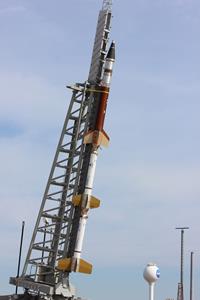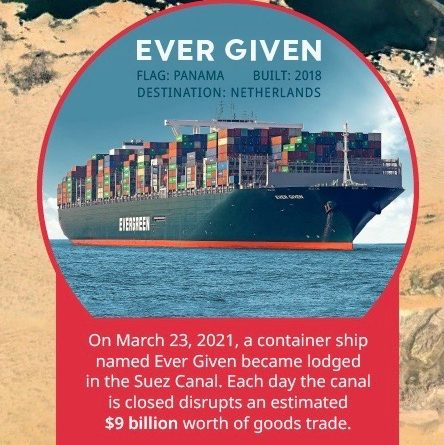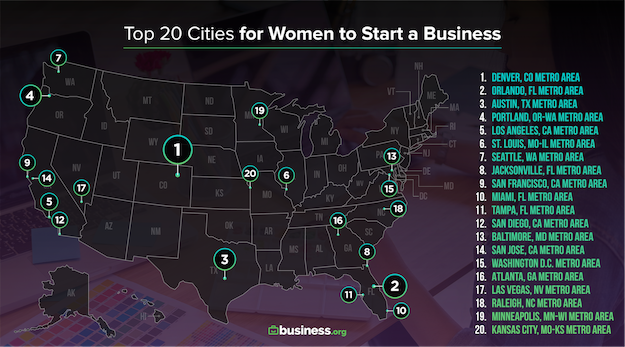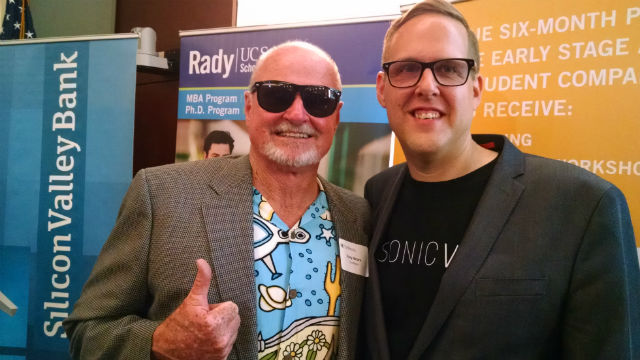Daily Business Report-March 29, 2021
Suez Canal: Critical Waterway Comes to a Halt
Visual Capitalist
NEWS UPDATE: The Ever Given cargo ship blocking the Suez Canal was partially refloated early today, five days after it ran aground.
On March 23, 2021, a massive ship named Ever Given became lodged in the Suez Canal, completely blocking traffic in both directions. According to the Suez Canal Authority, the 1,312 foot long (400 m) container ship ran aground during a sandstorm that caused low visibility, impacting the ship’s navigation. The vessel is owned by Taiwanese shipping firm, Evergreen Marine.
With over 200 vessels halted on either side of the canal, authorities are scrambling to dislodge the container ship and resume normal operations. This has proven to be a difficult task so far, and experts are warning that the process could take weeks.
Constructed in 1869, the Suez Canal is an Egyptian sea-level waterway that provides a vital shipping route between Europe and Asia. Without this route, ships would need to sail around Africa, adding an entire week to their trips.
The connecting link between two important regional economies, the canal facilitates a significant amount of trade. The Suez Canal Authority (SCA) reported that 19,000 vessels—averaging to 52 a day—had sailed through its waters in 2020.
The total volume of cargo being transported through the canal has increased steadily in recent years. This includes consumer goods, dry-bulk cargo such as grain and minerals, and oil products.
Implications of the Blockage
The blockage of such an important shipping route is bound to have consequences. According to Lloyd’s List, each day the Suez Canal is closed disrupts over $9 billion worth of goods trade.
San Diego region awarded $10.5 million for Del Mar bluff repairs
SANDAG and North County Transit District (NCTD) received $10.5 million from the State Transportation Improvement Program’s Interregional Transportation Improvement Program to complete repairs along the Del Mar Bluffs following a late February collapse.
“This funding will make it possible to complete emergency repairs that are critical to ensuring the LOSSAN rail line — the second busiest in the nation — can continue operations while SANDAG explores plans to permanently move the tracks off the bluffs,” said SANDAG Chair and Encinitas Mayor Catherine Blakespear.
On Sunday, Feb. 28, the Del Mar Bluffs suffered a failure just south of 4th Street in the City of Del Mar and geotechnical experts determined that train service could be operated safely at a reduced speed.
Over the next several months, construction crews will install up to 18 support columns along the upper bluffs to support the railroad and build a new seawall along the beach to reinforce the base of the bluffs. The work is expected to be complete in July 2021.
New protein helps carnivorous plants sense and trap their prey
The brush of an insect’s wing is enough to trigger a Venus flytrap to snap shut, but the biology of how these plants sense and respond to touch is still poorly understood, especially at the molecular level. Now, a new study by Salk and Scripps Research scientists identifies what appears to be a key protein involved in touch sensitivity for flytraps and other carnivorous plants.
The findings, published March 16, 2021, in the journal eLife, help explain a critical process that has long puzzled botanists. This could help scientists better understand how plants of all kinds sense and respond to mechanical stimulation, and could also have a potential application in medical therapies that mechanically stimulate human cells such as neurons.
“We know that plants sense touch,” says co-corresponding author Joanne Chory, director of Salk’s Plant Molecular and Cellular Biology Laboratory and holder of the Howard H. and Maryam R. Newman Chair in Plant Biology. “The Venus flytrap, which has a very fast response to touch, provides an opportunity to study a sensory modality that historically has been poorly understood.
Scripps Green Hospital first in region to use novel lung biopsy technology
Doctors at Scripps Green Hospital recently became the first west of the Mississippi to perform bronchoscopy with an innovative imaging technology that is designed to help improve the way physicians diagnose lung cancer by more accurately collecting biopsy samples from difficult-to-reach lung nodules. The technology is available to patients as part of the Scripps MD Anderson Cancer Centerpartnership.
The goal of the new imaging system is to provide early, highly accurate diagnoses of suspicious lung nodules, particularly small lesions located in the lung’s periphery. The timing of lung cancer detection is critically important, since survival rates are generally far higher for patients diagnosed with early-stage disease, compared to those whose disease is confirmed later.

Kratos Defense supports successful rocket launch payload for U.S. Space Force
Kratos Defense & Security Solutions Inc, announced that its Sounding Rocket Program (SRP)-4 launch vehicle team under subcontract to Space Vector Corporation successfully launched a scientific experiment for the U.S. Space Force Space and Missile Systems Center’s Launch Enterprise from the Wallops Flight Facility in Virginia. It was the first launch of a sounding rocket vehicle under SRP-4, a contract that was awarded to the Space Vector Corporation in partnership with Kratos in December of 2018.
The three-stage Terrier-Terrier-Oriole sounding rocket carrying the Air Force Research Laboratory experiment, lifted off March 3 and flew a nominal flight profile, successfully executing all experiment events, on its way to a planned splashdown in the Atlantic Ocean.
Thermo Fisher launches device to detect airborne COVID-19
Carlsbad’s Thermo Fisher Scientific unveiled a device that can be used to detect a variety of airborne pathogens, including COVID-19. The company hopes to deploy the technology in hospitals, offices, schools and other buildings to monitor for signs of the virus as society begins to reopen.
TuSimple files to go public
TuSimple, the self-driving truck startup backed by Navistar, Goodyear, and freight company US. Xpress, filed for an initial public offering. In addition to its San Diego headquarters, the company has an engineering center and truck depot in Tucson, a facility in Texas to support its autonomous trips, and operates in Beijing and Shanghai.
Video game startup HiDef Inc. pulls in $7.5 million in VC funding
HiDef Inc., a San Diego video game startup founded by entertainment industry veterans, has raised $7.5 million in a Series A round. The company will use the money to ramp up development of its first flagship game, described as “a genre-defining metaverse that places users of all ages at the creative center of its daily programming.”
Commentary:
Attorney General selection was pre-ordained
By Dan Walters | CalMatters Columnist
Given California’s current political climate, Gov. Gavin Newsom’s selection of Assemblyman Rob Bonta to be attorney general was virtually preordained.
Newsom ardently embraces the identity politics that dominate his Democratic Party and therefore feels compelled to pay homage to its major ethnic, gender and cultural components via appointments.
All of his recent appointments — and the promise vis-à-vis Feinstein’s seat — left one major group, Asian-Americans, still waiting for its due in the complicated machinations of identity politics.
When, therefore, Attorney General Xavier Becerra was tapped by President Joe Biden to become health and welfare secretary, Newsom was virtually compelled to name an Asian-American successor — even more so in response to the recent spate of anti-Asian violence.
NuVasive announces retirement of Gregory Lucier from board of directors
NuVasive Inc. a leader in spine technology innovation, announced the retirement of Gregory T. Lucier from the NuVasive Board of Directors effective May 18, 2021.
Lucier joined the NuVasive Board of Directors in December 2013, was elected Board chairman in May 2015, and served as NuVasive chief executive officer from May 2015 to November 2018.
In his tenure, Lucier led the company’s growth to more than $1 billion in net sales and oversaw the continued global expansion of the business. Under his leadership, NuVasive built a state-of-the-art manufacturing facility in West Carrollton, Ohio where it now manufactures a majority of its spinal implants.
Lucier’s commitment to innovation is evident in the research and development he championed at NuVasive, such as the X360 system, Advanced Materials Science portfolio, and Pulse platform.





